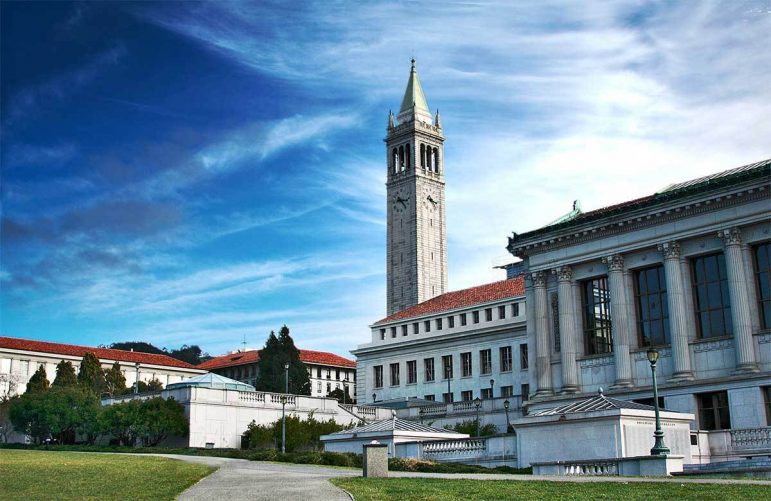Next Monday, the U.S. Supreme Court is set to hear arguments about whether considering race as a factor during the admission process is lawful — a decision that could have a big impact on the admissions practices of private colleges in California and the institutions outside the state that many Californians attend.
California banned affirmative action in its public universities in 1996 through Proposition 209, but there are high stakes for Californians in the Supreme Court case, said Michele Siqueiros, president of The Campaign for College Opportunity.
“Some maybe think that this national conversation about affirmative action in college admissions doesn’t affect our state because of the Prop. 209 ban, but they are mistaken for many reasons,” she said Monday during a media briefing on the case.
She noted that private colleges in California serve as many students as the University of California does — over 356,000 undergraduate and graduate students in 2020, according to the Association of Independent California Colleges and Universities.
Private universities and colleges in California are allowed to consider race as a factor in admissions, but that could change if the Supreme Court sides with a plaintiff who has sued Harvard University and the University of North Carolina.
Additionally, 10.5% of college-bound students in California — or over 31,000 students — attended school out of state, according to the most recent data from the California Department of Education for the class of 2018.
A number of private and public institutions of higher education signed amicus briefs in support of using affirmative action during the admissions process. That includes California institutions, such as Stanford University, Pomona College and the California Institute of Technology. The deans of several law schools, including some in California, also argued in favor of affirmative action.
The court is being asked whether it should overrule its 2003 opinion in a case brought by a white student rejected from the University of Michigan’s law school. That is one of a series of cases that established that institutions can use race as a factor in admissions. The latest cases, brought by Edward Blum of Students for Fair Admissions, argues that affirmative action penalizes white and Asian American applicants, violating their federal civil rights.
Stanford University joined the Massachusetts Institute of Technology and IBM in a brief stating that “holistic, race-conscious admissions processes remain essential to achieve the benefits of student body diversity, particularly in STEM programs — and no race-neutral alternative currently provides a workable means of achieving this critical objective.”
It’s a conclusion also outlined by the University of California in its brief to the court. The UC system stated that it created race-neutral outreach programs that have been extremely costly but ineffective, particularly at recruiting Black and Native American students. Diversity at its campuses dropped precipitously when the state’s ban on affirmative action went into effect in 1998.
The California Institute of Technology signed on to a brief from some of the country’s most selective institutions, arguing that a ruling against affirmative action would mark an intrusion of the court’s “long and established tradition of granting universities latitude to make educational judgments and respecting their academic freedom.”
These institutions said that building a diverse student body contributes to the development of knowledge. The brief describes the role of Black and Indigenous students at Cornell University in reshaping the field of archeology.
“As a white archaeologist with Greek and northwestern European heritage, I’ve felt challenged by Black and Indigenous archaeologies to learn how modern history impacts where we are today in the Mediterranean,” said Rebecca Gerdes, a Cornell doctoral student who spoke about the research on a podcast last February.

Researchers at Carnegie Mellon University were able to improve electroencephalograms, a medical technology that measures brainwaves through electrodes placed on the scalp. The technology didn’t work well for those with curly, coarse hair, but a team of researchers that included a Black undergraduate developed a new kind of electrode and a braiding technique that allows Black patients to receive care.
Students For Fair Admissions argues that race-conscious policies diminish the value of admission for students of color. But institutions said that race is just one of numerous individual factors that they consider in admissions, including socioeconomic background, parents’ education, what language was spoken at home, whether a student went to a school that was public or private, large or small, religious or secular. A race-conscious admission process shouldn’t inspire prejudice more than if a college seeks to admit students from various states.
“All admitted students — regardless of geographic, racial, or ethnic background — are selected because in the university’s best judgment, those particular students are expected to contribute most to the university community,” the brief said.
Small, highly selective liberal arts colleges, including Pomona College in Claremont, said that the benefits of racial diversity — improved learning, a decrease in prejudice, pedagogical innovation — are especially pronounced at institutions where “smaller class sizes lead to greater engagement among diverse students.”
A large group of Catholic colleges and universities, which includes Santa Clara University, Franciscan School of Theology and Mount Saint Mary’s University-Los Angeles, signed a brief stating that racial and ethnic diversity is important not just for its academic, but also for its religious mission.
“The education that students receive in a diverse environment, including a racially diverse environment, serves Catholic values of respect for universal human dignity and divine creation, and in turn creates alumni equipped to contribute to Catholic goals of leadership in service,” the brief states.
Thomas Saenz, the president and general counsel of the Mexican American Legal Defense and Educational Fund, said that he worries about the chilling effect that the decision could have on the admissions process or the college experience. He points to California’s own experience in banning affirmative action. When Proposition 209 passed, there was an “overinterpretation” in many parts of higher education that had nothing to do with admissions, he said. Many in California concluded that even a discussion of racial disparities in admissions was off-limits, he said. Some lawyers advised institutions that they could not at all seek to address racial disparities in admission guidelines, Saenz said.
“There were many policymakers on boards who concluded they could not discuss race at all,” he said.
Whatever the outcome of this decision, the legal implications should only affect the ability of institutions to consider race as a factor, he said. It should not apply to employment or contracts, as well as programs on campus aimed at racial and ethnic minorities. Discussing race in admissions, studying it and seeking to address continuing disparities in admission rates should not be barred, he said.
The overreach of the affirmative action ban even extended to how students could describe themselves. Sally Chen said that her high school counselor in San Francisco tried to dissuade her from writing about her experience growing up in a working-class Chinese immigrant community. Chen ignored that advice and was admitted to Harvard. She has since graduated and now serves as an Asian American education equity advocate for the group Chinese for Affirmative Action. She worries about the messaging that may come out of a decision against affirmative action. Some prospective students may feel like they don’t belong or should hide aspects of their experience and identity.
Saenz worries that should the court rule against affirmative action, poorly trained high school counselors may try to dissuade students from talking about their race or ethnicity in their application.
“They’re going to, in effect, advise students not to be themselves,” Saenz said.
